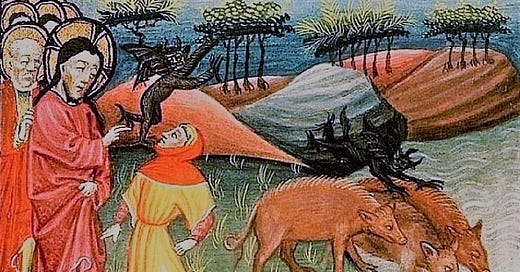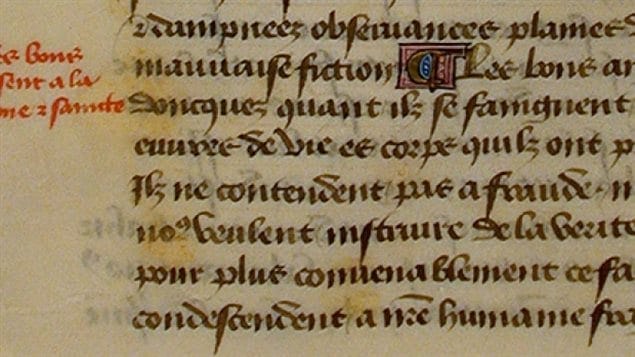Men of the Trade
Anyone familiar with the 1980s alternative music scene would recognize my friend’s stage name. For privacy, I’m going to call him Chris, which is neither his real name nor his former alias. As the bassist and lyricist for a band that achieved brief notoriety with a single celebrating a sex act banned in seven states at the time, Chris embodied the DIY/punk ethos later co-opted and commercialized by the 90s grunge scene. After a brief second act as a spoken word performer, Chris took his last bows, signed a few copies of his hand-lithographed poetry collections, and disappeared from the stage forever.
After a three-year self-imposed exile, about which he never spoke, Chris re-emerged as a rare book dealer. He soon earned a reputation, among collectors and dealers, for tracking down rare books on the occult and black magic, grimoires reputed to be bound in human flesh, priceless tomes of forbidden knowledge whispered to grant great blessings, or curses, upon the fearless practitioner. That sort of thing. I knew all of this because after a more modest trajectory than Chris’ through the same west-end punk scene, I, too, had gone into the rare book trade. We’d crossed paths in our punk rock days, so it was natural for Chris and I to fall into a casual friendship when our post-music career trajectories returned us to a shared orbit.
Friends is too strong a word—we used book dealers understand our mutual obsession too well to let our guards down in each other’s company—but Chris and I were more than colleagues and we certainly weren’t competitors. Chris was successful enough to grant his wealthiest clients the right-of-first-refusal for the books and scrolls and rings and mummified body parts that passed through his hands. Whatever was left over, Chris made available to humble traders like myself, an arrangement I had no cause to complain of as it facilitated many lucrative sales to my own clients. He seemed to enjoy my successes as much I did, and not just because they were no threat to him, and we began to cap off our business meetings with a bottle of home-brew back at his apartment.
So my feelings were decidedly mixed when a wealthy collector told me that he’d heard Chris was exiting the business. Mixed because, as much I enjoyed my relationship with Chris—it benefitted me financially as well as casting me in what passes for a glamorous light in our trade—I stood to gain more from his absence. With Chris gone, I’d vault from the position of the country’s third-best dealer in occult tomes to second, with one dour septuagenarian Brit standing between me and the throne. And if Chris really was exiting the trade, he’d be selling his almost legendary inventory for pennies on the dollar to dealers like me.
I sat on this rumour for a couple of weeks, afraid to reveal my hidden agenda by asking Chris about it directly. Then one afternoon Chris invited me to his apartment. He didn’t mention business on the phone. He didn’t ask to meet me in a pub, as he normally did. It was Christmas Eve, a night of miracles. I couldn’t say no.
Chris lived in a narrow and strangely elongated apartment above a restaurant in Kensington Market that has changed names several times since the 80s. When I arrived I lingered for at least a minute door before ringing the buzzer of the downstairs door. I was nervous, my faced stricken by minute spasms of self-loathing, expressed as itchy patches in and around my nose. Like a distant relative hoping to cash in at the reading of a will, I felt like I’d come to Chris’s apartment to claim another man’s hard-won fortune. Never mind that he’d invited me, and never mind that, if Chris was in trouble, if he was sick or had fallen out of favour with one of his rich clients, I would help him any way I could. None of it mattered: the acquisitive, covetous book dealer that dwells deep in my heart—a creature I picture as a flame-blasted troll—was rubbing his long fingers in anticipation of another man’s declining fortunes.
I’d long wondered whose name Chris would pass on to his clients if he retired. Would it be me or that awful Brit or maybe some young keener making his bones? Did I rate?
Such were my thoughts as I watched a pack of customers leaving the vegan restaurant below Chris’s apartment, cheeks glowing from the craft beer and the promise of holidays.
I rang the buzzer. For most of the dozen or so years that I visited Chris there, he shared the apartment with a procession of young, beautiful woman, models, artists, musicians, all of a distinct physical type: short and curvy, with angular, full-lipped faces of the type grazed the photocopied pages of punk zines back in the day. The procession of Goth angels ended when a grad student who’d just moved in overdosed on ketamine after reading the first chapter of an 18th-century text on demonology in Chris’ book collection—or so went the lurid rumours on a few occult chat sites. Whatever the actual circumstances, after her death Chris shifted his affections to a troop of stray cats he’d taken in, then confined his business to a few obscenely wealthy clients, cutting out all but the most necessary overseas trips.
Nothing in the apartment looked out of place. Old plastic milk crates housing Chris’s vast record collection ran the length of one living room wall; the other was dominated by book shelves, cabinets, and a jagged skyline of handmade climbing apparatus for the cats. Chris was more animated than usual, less closed-in on himself, and I even caught him humming an old punk tune as he carefully poured the rich home-brew into a pair of campy Bavarian steins, the kind with the lids that flip up. He’d fed the cats before I arrived, and they lounged on the climbing towers cleaning themselves and staring at whatever invisible sights capture the attention of satiated cats.
But by the time Chris sat on the couch across from me, his mood had seesawed. He fingered the lid of his stein before taking a long gulp from the beer. He was buying time. Maybe because his indecision was so out of character, I began to study the couch cushions for signs of his ex-lover’s suicide. The couch was likely a replacement for the original, but my mind needed something awful to chew on to pass the time. The Covid restrictions had killed business at my little shop that winter; I needed what only Chris could offer, one of those rare occult volumes he seemed to conjure out of the ether. And he knew what I needed.
“I guess you heard, eh?”
There was no point denying it. So drawing on the whatever reservoir of good feeling lies deep in the cellars of my heart, I said, “Yeah. It’s not true, is it?” What relief to know, at least for those few seconds, I was sincerely wishing my friend well.
“It is,” he said. “By the way, I’ve got some books for you.” He nodded at three low piles of books stacked beside his beer stein. “We’ll talk about it later.” One of his knees was bouncing up and down, a ghost gesture from his abandoned amphetamine-charged stage persona. Chris was still as lean and wiry as his twenty-year-old self, but deep age lines seemed to divide his face into almost discrete sections. He kept looking over at his cats; I could have sworn he was re-counting them. He wasn’t right.
To read Part II of The Heart of a Pig, “On the Nature of the Occult,” click here. Feel free to comment on the story below.






Enjoyed reading this (there are a couple typos, ie: faced for face), but this story made me wonder where Kensington Market was. Could it be the neighborhood in San Diego where I worked for many years? There were lots of artists, musicians and bookstores on Adams Avenue. Anyway, look forward to reading Part II.